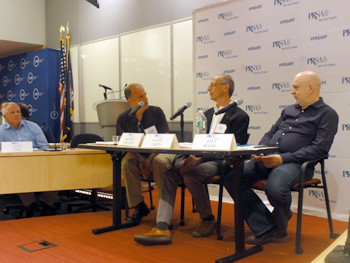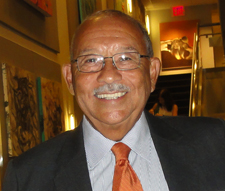 L-R: Panelists Steve Cody, Michael Schubert, Randy Cohen and Paul Holmes. Photos: Sharlene Spingler
|
Paul Holmes of The Holmes Report and ex-New York Times “Ethicist” columnist Randy Cohen argued heatedly Sept. 8 about the ethics of repping tobacco (Holmes favoring it).
The argument took place towards the end of the 90-minute program of the New York chapter that considered whether PR is “deceptive, non-transparent and of little value to clients or society.”
Cohen said it’s unethical to represent a “toxic product that kills 400,000 people a year” while Holmes said people have the right to make their own decisions about this.
PAUL: My point is you can do unethical work for ethical causes and you can do ethical work for clients that many – I mean it’s quite possible to represent the tobacco industry ethically. You can communicate entirely honestly on behalf of the tobacco industry.
MICHAEL SCHUBERT (Ruder Finn): And the tobacco industry is…
PAUL: and you can communicate entirely unethically on behalf of the American Cancer Society.
RANDY: Well, it depends on how narrowly you define ethics. If you're defining it only as business practices, yes that’s so, you can be an honest slave dealer and at the slavery block you always give people the correct change…
PAUL: That’s a really [inaudible] analogy.
RANDY: I don’t think so. I don’t think so. Unless you question the fundamental transaction that you're actually involved in which is the slave trade itself, it doesn’t MATTER how ethical your business practice is.
PAUL: There’s something fundamentally unethical about owning slaves. There’s nothing fundamentally unethical about smoking a cigarette.
RANDY: No, but there’s something fundamentally unethical about selling a toxic product that kills 400,000 people a year.
PAUL: Is it unethical…
RANDY: Yes, it’s unethical. If that isn’t unethical what is?
PAUL: Is it unethical to sell….
RANDY: ….to sell toxic products. Really? Are you really going to …
Unethical to Sell Skis?
PAUL: Is it unethical to sell (skis)?
RANDY: Is there any, I’m not demanding – yes, it’s ethical to sell skis. Is there any injury ancillary to the activity, of course there is, that’s fine. But there’s…
PAUL: So people have no right to make their own decisions?
RANDY: People have no right – once you shift it to a consumer question you’ve already cheated the question. The question isn’t whether someone has the right to buy. The question is whether someone has the right to sell it. It’s that, you know, you have no right to sell tainted meat here in America. We have food and drug laws. You have no right to sell a product that is, when used as directed, [inaudable] – the death rate is 400,000 a year, you're really defending this ?!
PAUL: You're an ethicist. There is a difference between selling tainted meat and selling cigarettes, yes..
 Spurlock |
RANDY: Yes, that’s right, because when you…
PAUL: ...because when somebody buys meat they have a reasonable expectation that that meat will not kill them. When they buy a cigarette they know full well that that cigarette could kill them, they make the choice to do so.
RANDY: No. This is a false notion of free choice that’s built in a completely false assumption about how decisions are actually made. Is there a psychologist in the house when we need one. There’s not free choice. People are not spending hundreds of millions of dollars to advertise because they think a free choice will be freely made by free thinkers. People’s behavior is subject to all sorts of influences. Again..
PAUL: I could argue that there is an ethical case to be made that what you are doing is infantilizing people. You are taking away their agency
RANDY: Fire codes? Speed limits? You don’t like speed limits? That takes away their agency.
PAUL: Absolutely because that harms other people.
RANDY: Fire codes? You can’t build a kerosene-soaked…
PAUL: What I’m talking about here is the right for people to do things for themselves.
RANDY: No. That’s what YOU'RE talking about here. What I’m talking about here is the right to sell a product , that to knowingly sell a product that use as directed is fatal. It’s toxic. We know this. And the death rate to justify 400,000 a year. You see this as a free choice question? I see this as a question from the producer’s side not from the consumer’s side, and that it is a P.R. trick to shift it to a consumer question rather than a producer’s question.
PAUL: Thank you [inaudible]
RANDY: If I may..
DOUGLAS SIMON, Jury Foreman: Go ahead Michael.
MICHAEL: I just want to inject one point because I come from a company that when the surgeon general came out with its warning and it was determined even before the surgeon general came out with this warning but when it started to be explored that cigarettes really were harmful to your health many, many years ago, we resigned all our cigarettes accounts and would not promote cigarette smoking to people because even if they knew it was bad, you could, P.R., you could be promoting selling something and getting people to do something that was not good for them and we didn’t want to be part of that.


 Helga Ying, who is in charge of International AIDS Society’s offices in San Francisco and Oakland, is moving to Edelman as global and US chair of Purpose.
Helga Ying, who is in charge of International AIDS Society’s offices in San Francisco and Oakland, is moving to Edelman as global and US chair of Purpose.  Emmanuel Tchividijian, who was senior VP/chief ethics officer at Ruder Finn in a 20-year stint, has established
Emmanuel Tchividijian, who was senior VP/chief ethics officer at Ruder Finn in a 20-year stint, has established  Every profession needs codes of conduct to help ensure the credible performance of its members. The public relations profession has several codes aimed at building and sustaining positive behavior but none of them addresses how practitioners must write for PR and related business purposes. (3 reader comments)
Every profession needs codes of conduct to help ensure the credible performance of its members. The public relations profession has several codes aimed at building and sustaining positive behavior but none of them addresses how practitioners must write for PR and related business purposes. (3 reader comments) Workplace diversity Issues, ranging from race to gender, have long been high profile threats to the brand. Ageism has been the exception - until now. (2 reader comments)
Workplace diversity Issues, ranging from race to gender, have long been high profile threats to the brand. Ageism has been the exception - until now. (2 reader comments) There's a battle for truth, in which people no longer share common facts and are unable to have a rational debate, Richard Edelman said during his speech at USC Annenberg School of Communication and Journalism on April 12. (1 reader comment)
There's a battle for truth, in which people no longer share common facts and are unable to have a rational debate, Richard Edelman said during his speech at USC Annenberg School of Communication and Journalism on April 12. (1 reader comment)


 Have a comment? Send it to
Have a comment? Send it to 
No comments have been submitted for this story yet.